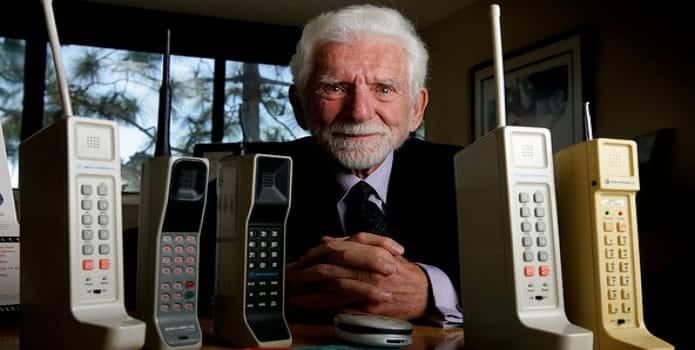Marty Cooper, The Guy Who Invented Cell Phones Thinks Apps Suck and Predicts ‘Skull Phone’
The inventor of the first cell phone, Martin Cooper thinks that someday we’ll all have tiny computers implanted behind our ears instead of phones. He also thinks apps are terrible.
Just in case you are ever asked the question in an interview, the acknowledged father of the cell phone is a gentleman named Martin Cooper. What Cooper did was invent the Motorola DynaTAC 8000X. From that point forward, the world was never the same ever before.
Motherboard interviewed Marty Cooper, the 89-year-old creator of the Motorola DynaTAC 8000X, which was the first handheld mobile phone-and Cooper made some bold predictions about the future of mobile technology.
Cooper has discussed how AT&T originally came up with cellular telephony and threatened Motorola’s two-way transceiver business. Motorola believed that putting a mobile phone in a car was the same as trapping people in a house or apartment with a home phone. “We believe, and still believe today,” said Cooper, “that freedom means that you can talk from anywhere.” Thus, the first personal portable telephone took birth.
On April 3, 1973 Cooper was walking down the streets of New York with a journalist and decided to roll the dice. He takes his personal cell phone and calls AT&T’s Bill Engel, whom Cooper calls his nemesis. When Engel picks up the phone, he quickly is told that he is being called by a personal cellphone, leading to a few moments of silence. “He probably was gritting his teeth,” Cooper says of his rival.
There is no doubt that Marty Cooper knows how important the cell phone has become. He puts it up there with the invention of the wheel and says that it will take a couple of generations before the cell phone shows all that it is capable of doing.
The man who invented the cell phone is no fan of apps. He says having a million apps is useless. Instead of sorting through all of those apps and deciding which ones to install, Cooper believes that the best solution would be an Artificial Intelligence driven servant that would understand which solutions you need at the moment. Those solutions would be called apps. “Instead of looking for the apps, the apps are going to find us,” he says. Still thinking about the future, Cooper asks if it wouldn’t be better to make apps obsolete “by making something that creates the app for you?”
As crazy as that sounds, no one in 1972 could imagine that everyone walking down the streets of every major city would be preoccupied by a small screen on a small device that fits in the palm of the hand.
The cellphone is just growing, just wait & watch…!

